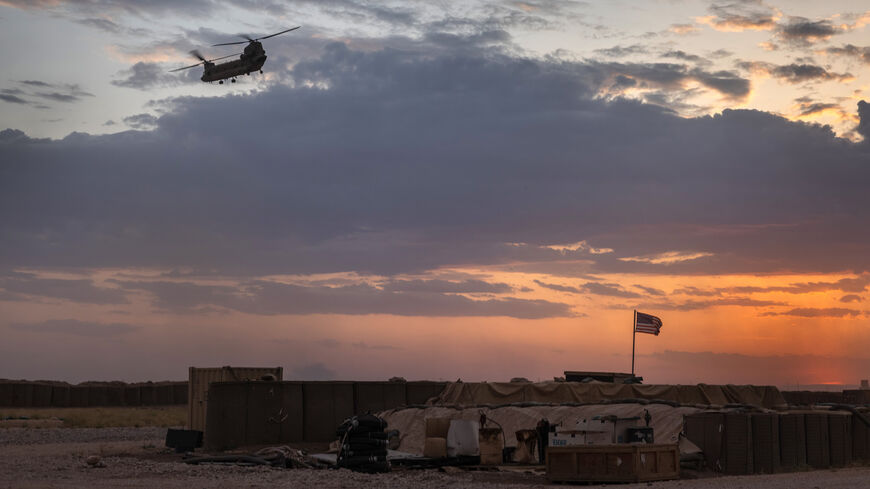Twenty-two US troops were injured in a helicopter “mishap” in northeast Syria on Sunday, the Pentagon’s Middle East headquarters revealed on Tuesday.
The military evacuated 15 of the injured soldiers to Landstuhl Regional Medical Center in Germany for treatment as of Tuesday evening, with one scheduled to be brought back to the United States for further care, according to a US military official. All of those injured were in stable condition and seven were scheduled to return to regular duty, the official said.
The helicopter took a hard landing during takeoff due to a problem with one of its rotors, Pentagon deputy press secretary Sabrina Singh told reporters on Tuesday afternoon.
CENTCOM officials said no “enemy fire” was reported to have been involved, but the incident remains under investigation.
Why it matters: All of the injured personnel were onboard an MH-47 Chinook helicopter for a mission, a US official speaking not for attribution told Al-Monitor.
MH-47s are used by US special operations units, but the specific forces and nature of the operation remained unclear.
More than four years after the Islamic State (IS) was wiped off the battlefield and driven underground, the United States retains roughly 900 troops in Syria and some 2,500 in Iraq in support of local forces to prevent the terror organization’s return.
American troops regularly accompany Syrian Kurdish fighters on partnered raids targeting suspected IS operatives in northeast Syria.
The pace of such missions has picked up over the past year, with US forces conducting 17 “partnered operations” with Syrian fighters in the month of May alone.
The New York Times reported on Thursday evening that the injured soldiers belonged to the US Army's elite Delta Force, a secretive tier-one US special operations unit whose track record in Syria includes helicopter-borne raids that led to the death of two of the Islamic State's subsequent top leaders.
Know more: The prolonged US presence in Syria is not without risks.
Four US troops and a working dog were wounded in February when an IS official triggered an explosion during a raid on his hideout.
Beyond IS, other parties to Syria's civil war have threatened American forces. The US has accused Iran-backed militia factions of launching several dozen rocket and drone attacks on US troop positions in recent years.
Such attacks are typically small-scale, but have killed American personnel in the past, leading the Biden administration to authorize retaliatory airstrikes targeting the militias and facilities they use on at least four occasions.
In March, Biden authorized strikes that killed at least eight militia fighters after an Iranian-made drone killed a US contractor and wounded other troops at a base near Hasakah.
Russian military forces supporting the Syrian regime in Damascus have also been increasingly harassing American forces in recent months, violating agreements with the US military, officials have said.
Armed Russian fighter and ground attack aircraft have been flying low over US bases in Syria, particularly al-Tanf garrison near the Jordanian border, without prior notification since late last year.
What’s next: Pentagon officials say US troops will remain in Syria for the foreseeable future.
The Biden administration has focused its diplomatic efforts on repatriating foreign IS prisoners to their home countries in a bid to reduce pressure on the Syrian Kurdish forces guarding them.
More than 50,000 people displaced from the 2019 collapse of IS’ self-styled caliphate remain in detention camps in northeast Syria, in addition to an estimated 10,000 captured IS fighters.
Northeast Syria’s self-styled autonomous administration, which is affiliated with the Kurdish-led forces, has long called international support to hold war crimes' tribunals for IS prisoners to no avail.
The autonomous administration claimed in an announcement over the weekend it would begin criminal trials for remaining IS detainees, but said the plan does not preclude "the need to establish an international tribunal or court of international standing specific to the issue of ISIS."
The commander of Syria's Kurdish-led militia alliance, Mazlum Abdi, said Tuesday his forces would continue to work alongside the US military.
"We wish a speedy recovery for the wounded of the crashed US helicopter in NE [northeast] Syria," a tweet published by Mazlum's account read.
Editor's note: This story was updated to include additional details on June 13.







